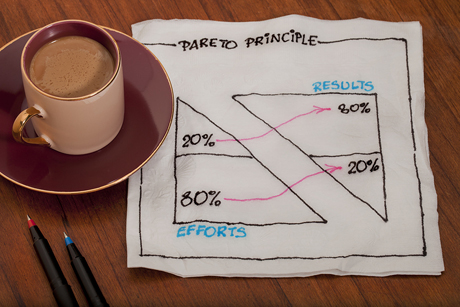Update: While working late on a Saturday night I was inspired to record a quick Periscope video on hard work and success. If you’re not already following me on Periscope, you can by searching for @sujanpatel on your Periscope app.
We love our “get rich quick” stories. We eat up news reports of entrepreneurs who have struck it big “overnight” – wondering how we ourselves would handle the sudden influx of wealth acquired through a startup buyout or IPO. And we’re incredibly susceptible to products that promise quick riches (no matter how illogical their roadmaps to achieving wealth might seem).
We love these stories because we’re all inherently lazy – we all want to do the least amount of work possible, while earning as much money as possible.
But unfortunately, this type of laziness – when left unchecked – can seriously derail your entrepreneurial dreams. The bottom line, hard truth of the matter is that running a business (whether successful or not) is damn hard. It’s hard work – day-in and day-out.
If you can’t handle that heat, get out of the industry. But if you’re willing to work hard to turn your entrepreneurial dreams into success, here’s what you need to know…
How hard is hard?
First of all, I think it’s important to be aware that we all have different visions of what “hard” work actually entails. A 60-hour work week might sound excruciatingly painful to some (especially those that are used to the “punch in, punch out” 9-to-5 work environment), while for others, 60 hours is just the start of true productivity.
So, to give you a realistic expectation of what entrepreneurial hard work looks like, consider the following responses from top business owners to the question “How many hours do you work, in total, every week?” (as compiled by Daniel Scocco of Daily Blog Tips):
- Darren Rowse: From 60 to 65.
- Rand Fishkin: Between 65 and 70, but some weeks as low as 55.
- Aaron Wall: 90+ hours typically, and often 100.
- Neil Patel: I work anywhere from 60 to 80 hours a week.
- Chris Pearson: I’ve definitely pulled my share of 80+ hour weeks, but to balance things out, I’ve also pulled my share of 20 hour weeks, too. As an average, I probably work 30–50 hours per week.
- Shawn Collins: Around 60 hours per week.
- Yaro Stark: In terms of productive output I probably do about 10-20 hours a week, but there’s plenty more time spent in front of the computer.
- Jonathan Volk: Around 60 hours per week.
- Dan Schawbel: I work approximately 110 hours per week depending if I’m traveling or not.
- Chris Garrett: As many as it takes. So up to 90 hours on some weeks, and only 50 on others.
- Collis Ta’eed: 40 to 60 hours usually.
- Trent Hamm: 40 to 45 hours.
Are you sensing a theme? With very few exceptions, the average number of hours invested each week by these great entrepreneurs tends to fall around 60 hours per week. If you aren’t ready to commit to this type of work schedule, you probably aren’t ready to be an entrepreneur.
Working smart versus working hard
Now, let’s get one thing straight here…
There’s a huge difference between somebody who sits down at his computer and “works” all day surfing the web and calling it market research, and an entrepreneur who approaches each day with a focused task list of the activities designed to have the greatest impact on his business.
The fact that you’ve parked your ass at a computer doesn’t necessarily mean that you’re working at all!
True entrepreneurs – at least, those who will go on to be successful – recognize that working hard and working smart aren’t the same thing. They know that work for work’s sake won’t move their businesses forward in the same way that focused, laser-targeted activity will. That’s why, out of all the famous entrepreneur responses listed above, Yaro Starak’s interests me the most, as it demonstrates that he understands the difference between productive work time and time spent on the computer.
If you want to be a successful entrepreneur, you’ve got to learn the difference between the two and implement smart work techniques into your own work days. Here are a few ideas on how to do this:
- Ruthlessly apply the 80/20 rule to your business activities – The 80/20 rule (or “Pareto’s Principle”) posits that 80% of all results stem from 20% of all sources (for example, 20% of all clients lead to 80% of all sales). Look at the activities you undertake every day through this lens and determine which ones are actively serving your business and which ones aren’t generating results.
- Constantly ask yourself, “Am I being busy or productive?” – Despite applying the 80/20 rule to your business life, some worthless tasks may still slip through the cracks. To combat these time-sucking stragglers, tape a Post-It note to your computer with the sentence above. Regularly ask yourself whether the activity you’re engaging in at any time will have a meaningful impact on your company or whether you’re using it to feel productive.
- Delegate, delegate, delegate – Very few businesses succeed on the strength of a single person’s efforts. Giving 110% to every aspect of your business (including sales, market research, accounting and more) isn’t humanly possible, so make it a priority to delegate work to employees or outsourced workers who complement your own weaknesses.
Optimize your life to prioritize hard work
So, by this point, you should be aware of the working demands placed on entrepreneurs, as well as the need to ensure that their working hours are as productive and effective as possible.
But there’s still one more key component to the idea of entrepreneurial success via hard work – long-term sustainability.
Say you have a great business idea and you go all in on committing to your new venture. You pull the same kinds of all-nighters you used to in college, living off of energy drinks, four-shot lattes and fast food delivery (because really, who has time to cook when they’re working 100+ hours a week?).
I give you a maximum of 1-2 weeks before you totally burn out.
The thing about entrepreneurship is that yes, it’s hard work, but it’s also hard work over a long period of time. As a result, it’s hugely important that small business owners prioritize their health and well-being alongside their business’s success.
In many ways, your body is like a car. Give it the wrong type of fuel and run it for days on end, and you’re bound to break down. Your body is the same way, so consider all of the following tips for balancing hard work with healthy living:
- Eat right and exercise regularly – Starting a business isn’t the time to let your healthy living habits slide. Your body needs the energy that well-planned meals and regular exercise provide now more than ever, so find a way to make these habits a part of your startup workload.
- Minimize distractions – If you spend time watching mindless TV or surfing the internet aimlessly, you’re wasting valuable mental real estate that would be better spent on growing your business. Tune out unnecessary time sucks and you’ll find yourself feeling more mentally agile and less tired from these types of brain drains.
- Take a damn break – Believe me, the world isn’t going to end if you step away from your computer for a half hour. Instead, taking occasional breaks to hang out with friends or grab a beer can help you to get a new perspective on your tasks and prevent burnout by allowing you to return to your tasks feeling refreshed and relaxed.
Now, I’m not saying I’m perfect at implementing these tips in my own life. I certainly still have days where I work too hard and take my friends, family members and healthy habits for granted.
However, after nearly a decade spent as an entrepreneur, I can safely say that I’ve found a balance that works for me. Your schedule might not look at all like mine, but by following this advice, you should be able to come up with your own system for balancing the hard work and other demands required to become a successful entrepreneur.
I deff identify with the “taking friends/family” for granted part sometimes when Im so sucked into work.
Finding a balance is deff crucial but thats something I guess every entrepreneur has to discover through their own experiences and priorities.
Sometiems, when you’re tryin to attain your goals – your priorities get mixed up and I believe that doing some simple excerszies like taking a walk and getting fresh air deff helps your refocus.
Anyway – awesome post as usual Sujan!
Great Image there about an Ant holding 3 biscuits! 🙂
You definitely said the right thing.. Working Smart is the best way to do a Productive job (according to me) as sometimes i found myself wasting time watching movies!
About taking care of personal health is strictly required, as Healthy nature can focus more!
Thanks a lot for sharing the quality information.
[…] every weekend or posting lavish things on Facebook, but what most people don’t see is the hard work behind the scenes that allows me to do the things I do – or the number of times I’ve allowed […]
[…] for you. Using a free website design only creates the illusion of ease. Case in point: this blog post describes some famous digital entrepreneurs, many of whom run notable blogs, and the hard hours […]
I read this article ….n its just awesome ……I hope it will help in my life …as well it will make my better n good future …………….
[…] overnight. Brands aren’t built in a day, but by taking time every week to put in some hard work on a few of these different priorities, you’ll find yourself sitting pretty with both a […]
[…] The sad reality of the business world is that great ideas are a dime a dozen. What separates the great entrepreneurs from their would-be competitors is whether or not they’re actually able to successfully execute their visions! […]
Why no women on this list? Very skewed sample of entrepreneurs!
Agreed!
Thanks for your reminder of the 80-20 rule



Comment (10) - Cancel Reply